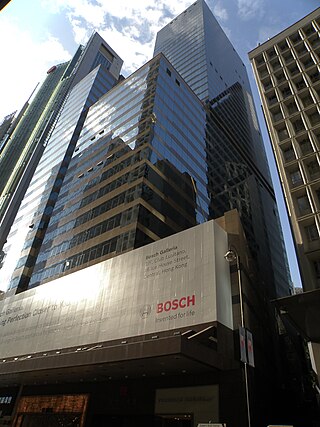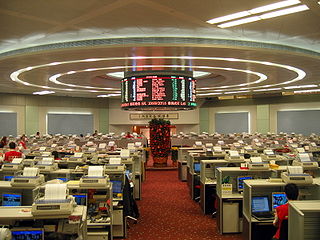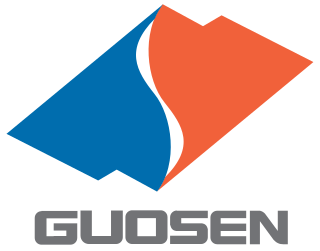Related Research Articles

PCCW Limited is a Hong Kong-based information and communication technology (ICT) company.

Australian Securities Exchange Ltd or ASX, is an Australian public company that operates Australia's primary securities exchange, the Australian Securities Exchange. The ASX was formed on 1 April 1987, through incorporation under legislation of the Australian Parliament as an amalgamation of the six state securities exchanges, and merged with the Sydney Futures Exchange in 2006.

Black Monday is the name commonly given to the global, sudden, severe, and largely unexpected stock market crash on Monday, October 19, 1987. In Australia and New Zealand, the day is also referred to as Black Tuesday because of the time zone difference from other English-speaking countries. All of the twenty-three major world markets experienced a sharp decline in October 1987. When measured in United States dollars, eight markets declined by 20 to 29%, three by 30 to 39%, and three by more than 40%. The least affected was Austria while the most affected was Hong Kong with a drop of 45.8%. Out of twenty-three major industrial countries, nineteen had a decline greater than 20%. Worldwide losses were estimated at US$1.71 trillion. The severity of the crash sparked fears of extended economic instability or even a reprise of the Great Depression.

New World Development Company Limited (NWD), is a Hong Kong-based company focused on property, hotels, infrastructure and services and department stores. It was established on 29 May 1970 by Cheng Yu-tung. The company is publicly listed on the Stock Exchange of Hong Kong Limited since 23 November 1972 and is a constituent stock of Hong Kong Hang Seng Index.

The Stock Exchange of Hong Kong is a stock exchange based in Hong Kong. As of the end of 2020, it has 2,538 listed companies with a combined market capitalization of HK$47 trillion. It is reported as the fastest growing stock exchange in Asia.

Bank of China (Hong Kong) Limited (Chinese: 中國銀行(香港)有限公司) also known as its short name Bank of China (Hong Kong) or BOCHK (Chinese: 中銀香港), is a subsidiary of the Bank of China (via a Hong Kong-listed intermediate holding company BOC Hong Kong (Holdings)). Bank of China (Hong Kong) is the second-largest commercial banking group in Hong Kong in terms of assets and customer deposits (2008 data), with more than 190 branches across Hong Kong as of the end of 2019. It is also one of the three commercial banks licensed by the Hong Kong Monetary Authority to issue banknotes for the Hong Kong dollar.

Hong Kong Exchanges and Clearing Limited operates a range of equity, commodity, fixed income and currency markets through its wholly owned subsidiaries The Stock Exchange of Hong Kong Limited (SEHK), Hong Kong Futures Exchange Limited (HKFE) and London Metal Exchange (LME).

CITIC Limited is a conglomerate headquartered in Hong Kong. Its shares are listed on the Main Board of the Hong Kong Stock Exchange, and it is a constituent of the Hang Seng Index. 58% of its issued shares are owned by the Chinese state-owned CITIC Group.

David Michael Webb is an activist investor, share market analyst and retired investment banker based in Hong Kong.
Robert Ng Chee Siong is a Singaporean billionaire businessman, and the chairman of Hong Kong property development conglomerate Sino Group since 1991.

The Securities and Futures Commission (SFC) of Hong Kong is the independent statutory body charged with regulating the securities and futures markets in Hong Kong. The SFC is responsible for fostering an orderly securities and futures markets, to protect investors and to help promote Hong Kong as an international financial centre and a key financial market in China. Even though it is considered to be a branch of the government, it is run independently under the authorisation of the laws relating to Securities and Futures.
Tracker Fund of Hong Kong or TraHK is a unit trust which provides investment results that correspond to the performance of the Hang Seng Index in the Hong Kong stock market.

Hong Kong Mercantile Exchange was an electronic commodities exchange established in Hong Kong for the trading of commodity futures, options and other financial derivatives. The exchange was originally pitched as a platform to trade oil futures. In fact, it ended up trading mainly silver and gold futures.
Concord New Energy Group Limited is an investment holding company and is listed on the Hong Kong stock exchange with its Hong Kong headquarters at Admiralty, Hong Kong. The company had a management office in Beijing. The Company and its subsidiaries are engaged in engineering, procurement and construction (EPC), operation and maintenance of wind power plants, the manufacture of wind power equipment and other wind power related business. The listed company and its predecessor, had a few former names: Nam Pei Hong (Holding) Limited, Nam Pei Hong International Holdings Limited, N P H International Holdings Limited, Hong Kong Pharmaceutical Holdings Limited and most recently China Windpower Group Limited.

Guosen Securities Company Limited is a Chinese state-owned financial services company headquartered in Shenzhen, China, with more than 70 branches and 11,500 employees nationwide. It has offices in 47 major cities in China including Shenzhen, Beijing, Guangzhou, Foshan, Nanjing, Shanghai, Tianjin and Hong Kong. Guosen Securities provides sales and trading, investment banking, research, asset management, private equity, and other financial services with both institutional and retail clients in China and Hong Kong. It also operates a trading platform called GuoXin TradingStation.
Coolpad Group Limited is a Chinese telecommunications equipment company headquartered in Shenzhen, Guangdong. It is incorporated in the Cayman Islands and listed on the Hong Kong Stock Exchange as SEHK: 2369. It is a large smartphone company ZTE in China and the largest Chinese domestic by sales outside of China. Since acquired by Jia Yueting, it was part of LeEco Group, but not under the group mainland's parent company Leshi Holding.
Since the late-2000s, the People's Republic of China (PRC) has sought to internationalize its official currency, the Renminbi (RMB). RMB internationalization accelerated in 2009 when China established the dim sum bond market and expanded Cross-Border Trade RMB Settlement Pilot Project, which helps establish pools of offshore RMB liquidity. The RMB was the 8th-most-traded currency in the world in 2013 and the 7th-most-traded in early 2014. By the end of 2014, RMB ranked 5th as the most traded currency, according to SWIFT's report, at 2.2% of SWIFT payment behind JPY (2.7%), GBP (7.9%), EUR (28.3%) and USD (44.6%). In February 2015, RMB became the second most used currency for trade and services, and reached the ninth position in forex trading. The RMB Qualified Foreign Institutional Investor (RQFII) quotas were also extended to five other countries — the UK, Singapore, France, Korea, Germany, and Canada, each with the quotas of ¥80 billion except Canada and Singapore (¥50bn). Previously, only Hong Kong was allowed, with a ¥270 billion quota.

Emperor Group is a diversified group of companies founded by Albert Yeung in Hong Kong. Albert Yeung's father, Mr Yeung Shing, opened a watch shop named "Shing On Kee Watch Shop" in 1942, setting the business foundation. Six companies within the Group are listed on the Main Board of The Stock Exchange of Hong Kong. These include Emperor International Holdings Limited, which focuses on real estate investment and property development; Emperor Watch and Jewellery Limited, which specializes in the retail of luxury watches and fine jewellery; Emperor Entertainment Hotel Limited, which concentrates on hotel and gaming businesses in Macau; Emperor Capital Group Limited, which provides a wide range of financial services; and Emperor Culture Group Limited, which principally engages in entertainment, media and cultural development business; and Ulferts International Limited, which is engaged in chain retailing of upmarket European furniture.

Interactive Brokers LLC (IB) is an American multinational brokerage firm. It operates the largest electronic trading platform in the U.S. by number of daily average revenue trades. The company brokers stocks, options, futures, EFPs, futures options, forex, bonds, funds, and some cryptocurrencies.
References
Notes
- 1 2 Studwell 2007 , p. 116
- 1 2 "Remembrance of Things Past: Hong Kong's market collapse of 20 years ago is worth recalling during the present turmoil", Asia Sentinel, 2007-10-23, retrieved 2009-06-05
- ↑ Studwell 2007 , p. 117
Sources
- Studwell, Joe (2007), Asian Godfathers: Money and Power in Hong Kong and Southeast Asia , Atlantic Monthly Press, ISBN 9780871139689